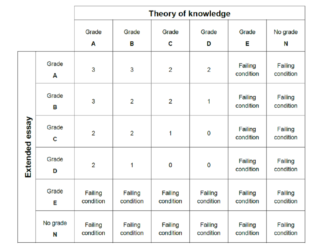Extended Essay
The extended essay is an in-depth study of a focused topic in one of the subjects studied for the IB diploma. It is intended to promote coherent research and writing skills, intellectual discovery and creativity. It provides students with an opportunity to engage in personal research on a topic of their own choice. Students are first introduced to the requirements of academic writing and then guided to pick a subject for the EE, which typically happens in the first IB year. The work is supervised by an IB teacher of the chosen EE subject. The EE is assessed by an external examiner. This leads to a major piece of formally presented, structured writing, in which ideas and findings are communicated in a reasoned and coherent manner, appropriate to the subject chosen.
The EE-Study Guide can be found here.
Essay scheduling, IMPORTANT!
The EE work starts, under the guidance of the supervisor, with the selection of the essay topic followed by the Research Question. This question must be decided on by 30. April of the IB1 -year. The supervisor oversees the writing process with a Reflection Form for which the student provides the necessary essay info. The student will not be transferred to IB2-year if this info is not submitted to the supervisor. At this point, the EE-subject cannot be changed anymore. The first Draft Version must be submitted to the supervisor by 30. October of IB2-year. The IB coordinator registers the student for the Final Exams only if the Draft has been submitted by the deadline. The Final Draft must be submitted to the supervisor and coordinator by the first school day after the Christmas break.
The extended essay is assessed against common criteria, interpreted in ways appropriate to each subject.
The extended essay is:
- compulsory for all Diploma Programme students
- externally assessed and, in combination with the grade for theory of knowledge, contributes up to three points to the total score for the IB diploma
- a piece of independent research/investigation on a topic chosen by the student in cooperation with a supervisor in the school
- chosen from the list of approved Diploma Programme subjects
- presented as a formal piece of scholarship containing no more than 4,000 words
- the result of approximately 40 hours of work by the student
- concluded with a short interview, or viva voce, with the supervising teacher (recommended).
Theory of Knowledge
Theory of Knowledge is considered the philosophical, and ideological, core of the Diploma Programme. It’s catchphrase is “How do we know what we claim to know?” Theory of Knowledge studies account for roughly 3.6 courses in length spanning throughout the two IB years. The purpose of the interdisciplinary (covering all the subjects) TOK course is to accustom the students to taking a critical look into what knowledge actually is and how culturally bound it is, which, in turn, is meant to enhance cultural understanding. Students write a TOK essay, 1600 words max and it is externally assessed. An oral presntation also belongs to the course.
Creativity, Activity, Service
CAS is an is an essential part of the IB Diploma programme and it is completed outside classes. The CAS Programme lasts throughout the two acadmic years. Participation in CAS enables students to draw on for example their artistic or sports interests and engage in community service, thus providing a meaningful change from the school routines. It also improves the students’ interactive skills when they take other people’s needs into consideration. All the three CAS areas (Creativity, Activity and Service) must be featured in a student’s CAS Project.
TOK and the extended essay
The performance of a student in both Diploma Programme requirements, theory of knowledge and the extended essay, is determined according to the quality of the work, based on the application of the IB Diploma Programme assessment criteria. It is described by one of the band descriptors A–E. Using the two performance levels and the diploma points matrix, a maximum of three diploma points can be awarded for a student’s combined performance. The bonus points for CAS and TOK as well as the failing conditions can be seen in the matrix below.

